The week ahead in Parliament
- Published
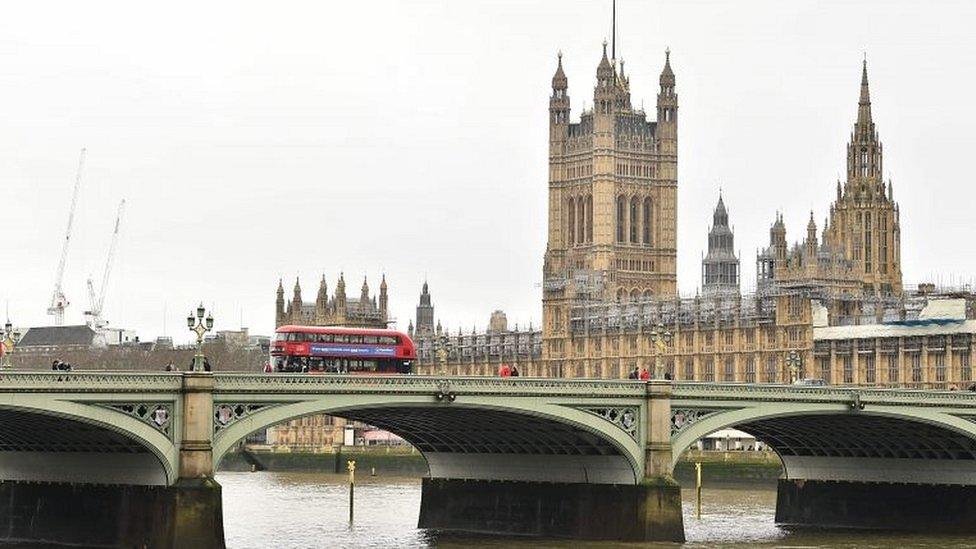
On the face of it, the next parliamentary week does not provide many opportunities for the beneficiaries of Boris Johnson's reshuffle to strut their stuff.
None of the new cabinet members face departmental questions (although the latest MP through the revolving door into the minister of housing's office, Chris Pincher, will be up on Monday).
But there is always the chance that the fates may decree that they have to deliver a ministerial statement or face an urgent question.
Will Sajid Javid deliver a resignation statement? Because that would be a major event - traditionally delivered in prime time and heard in silence. And statements from some of the other dear departed from the previous cabinet (Andrea Leadsom, Julian Smith) would be interesting, too.
The new select committee chairs have been elected, the parties have chosen the ordinary members - so why is the Committee Corridor still resemble the decks of the Marie Celeste?
The first part of the explanation is that Commons has to approve a series of motions to approve the membership of each committee, and these have not yet emerged from the Committee of Selection, the whips' clearing house for these decisions.
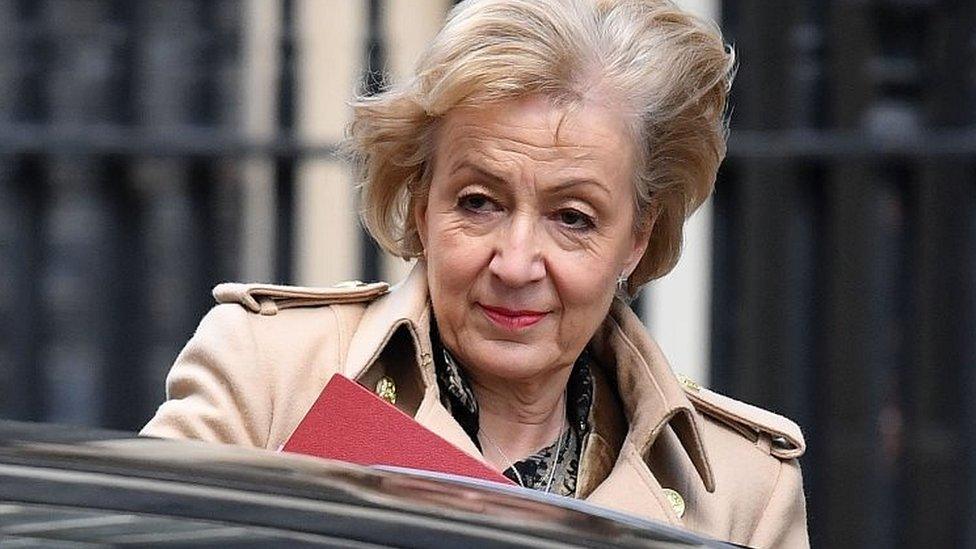
Will Andrea Leadsom have something to say?
One reason for the delay appears to be the possibility that some of the new committee members might be tapped up to serve in the government, either as ministers or, more pertinently for select committee purposes, as parliamentary private secretaries (AKA bag-carriers) which would mean that, as (very junior) members of the government, they would not normally be allowed to serve on the committees - although this rule has been stretched a bit, in recent times.
The next scheduled meeting of the Committee of Selection is on Wednesday 24 February, which (unless there's an early meeting) means MPs can't approve the new committees until Thursday 25 at the earliest.
That, in turn, means the new committees can't decide on their programme of inquiries and hearings until the first week of March - so most won't actually be able to quiz any witnesses until the week after, at the earliest.
Backbench Business Committee chairman Ian Mearns complained about the delays, and was assured the government wants the committees up and running as soon as possible. He did not seem entirely convinced.
There are a few workarounds to the continuing delays; with little else to do, the committee staffs have been preparing inquiries and lining up witnesses, so they could move quite fast, if their new committees give the go ahead, and perhaps others might move rapidly to set up a "getting to know you" session with their particular cabinet minister.
The Public Accounts Committee, the most powerful of the committees, works differently, with sessions scheduled on reports from the financial watchdog, the National Audit Office - they have hearings pencilled in on 4 March on HS2, on 9 March on special educational needs and on 11 March on defence nuclear infrastructure, but it will take some fast footwork for the first of those to go ahead.
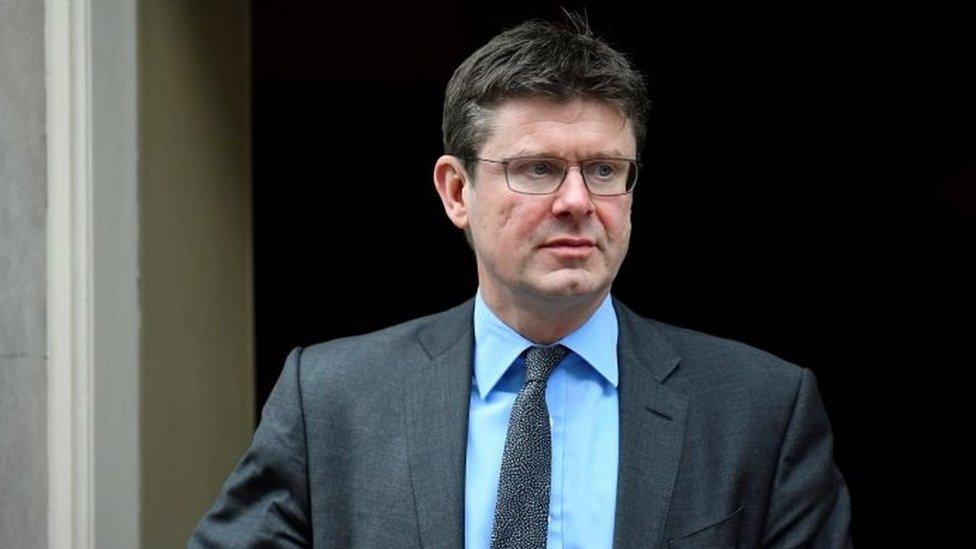
Will Greg Clark become the chair of chairs?
Meanwhile, the Lords select committee system is the only game in town - and they've just announced a post-Brexit reconfiguration of their sprawling EU scrutiny apparatus, creating a new Treaties Committee to examine the new trade agreements the government wishes to strike. And they have also announced a new Public Services Committee, to be chaired by the Labour peer and former government Chief Whip, Baroness Armstrong of Hill Top.
Lords committees are normally quite shy, timorous beasties, but this one has the potential, at least, to be a little more assertive.
And watch out for a few more significant parliamentary appointments - who will chair the Liaison Committee, the super committee of select committee chairs, which quizzes the prime minister twice a year?
I hear former Business Secretary Greg Clark, now chairing the Science and Technology Committee, is in the running, and Foreign Affairs Committee chairman Tom Tugendhat might want the job as well - other names are mooted, too.
The post does provide a national platform at those PM sessions, but it also involves great deal of internal committee business, sorting out foreign travel budgets and settling turf disputes.
Then there's the chair of the Intelligence and Security Committee (ISC) to replace the departed Dominic Grieve. This is not a select committee of the House, but a committee of parliamentarians, appointed by the prime minister to report to him and to Parliament about intelligence matters - for example, major terrorist incidents and whether Russia interfered in British politics.
Former Security Minister John Hayes, former Policing Minister Mike Penning and former Defence Committee chairman Julian Lewis are said to be in the running, but this is an appointment that is in the gift of the prime minister, and the choice may be some way down his to-do list.
Here's my rundown of the business for the week.
Monday 24 February
The Commons reconvenes (14:30) for an hour of Housing, Communities and Local Government Questions, which may provide a debut for the new housing minister, Chris Pincher, and that will probably be followed by a series of post-recess statements and urgent questions.
The main business, postponed to make way for the emergency legislation to curtail the early release of people jailed for terror offences, is the annual whinge-athon on local council and police spending in England and Wales, as MPs are asked to approve the Police Grant Report and Local Government Finance Reports for 2020-21
The government will point to the first real-terms increase in council spending for a decade - but the key issue will be the formula by which the money is distributed.
In the Lords (14:30) questions to ministers cover the spread of sexually transmitted infections in England, which UK nuclear power stations will be providing power to the National Grid in the 2030s, the issues caused by short-term holiday lets and the case for accepting refugee doctors to the UK.
The main legislative business is the rapid processing of the Terrorist Offenders (Restriction of Early Release) Bill - peers will take the Second Reading debate and all the stages of the bill in a single day - but keep an eye on the Lords' super lawyers and ex-judges, for qualms about retrospective legislation.
There will also be a short debate on ensuring that at least half of the communal changing or toilet facilities offered in public buildings are reserved for women only.
Tuesday 25 February

Talking rubbish: Landfill is on MPs' agenda
MPs gather (11:30) for Justice Questions.
Then comes a Ten Minute Rule Bill, from the Liberal Democrat Alistair Carmichael, to grant the right to live in the UK to Hong Kong residents.
The main debates will be on Labour motions, on tax avoidance and evasion, and on social care.
In Westminster Hall, subjects for debate include the UK oil and gas industry (09:30) - Scottish Conservative Andrew Bowie has been calling for reform in the regulation of the energy industry, and wants to make Aberdeen the energy capital of Europe, if not the world.
Labour's Lloyd Russell-Moyle leads a debate on equality of funding for post-16 education (14:30); Conservative Aaron Bell has an intriguing looking debate on odours emanating from landfill sites (16:00); and finally the Conservative Fay Jones leads a debate on Wales's contribution to the UK armed forces (16:30).
In the Lords (14:30) question time covers reinstating the war widows' pension for those widows who were required to surrender that pension due to marriage or cohabitation, insulating homes to help end fuel poverty, and security clearance policies for Afghan interpreters
Peers then canter through a couple of quick legislative chores - first the detail of the Sentencing (Pre-consolidation Amendments) Bill - a Law Commission Bill tweaking the law to bring the new Sentencing Code into operation, then the detail of the Birmingham Commonwealth Games Bill which deals with issues arising out of the 2022 games.
Then the Green Party's Baroness Jones of Moulsecoomb has a motion to regret a statutory instrument, the Electricity and Gas (Energy Company Obligation) (Amendment) Order 2019 - her concerns are that the ECO grants are severely limited in scope and are paid for by a levy on people's energy bills rather than through general taxation, so the poorest pay more, relatively.
She will be making the case for the Green Party 2019 manifesto policy for an ambitious new insulation scheme, paid for from general taxation.
Wednesday 26 February
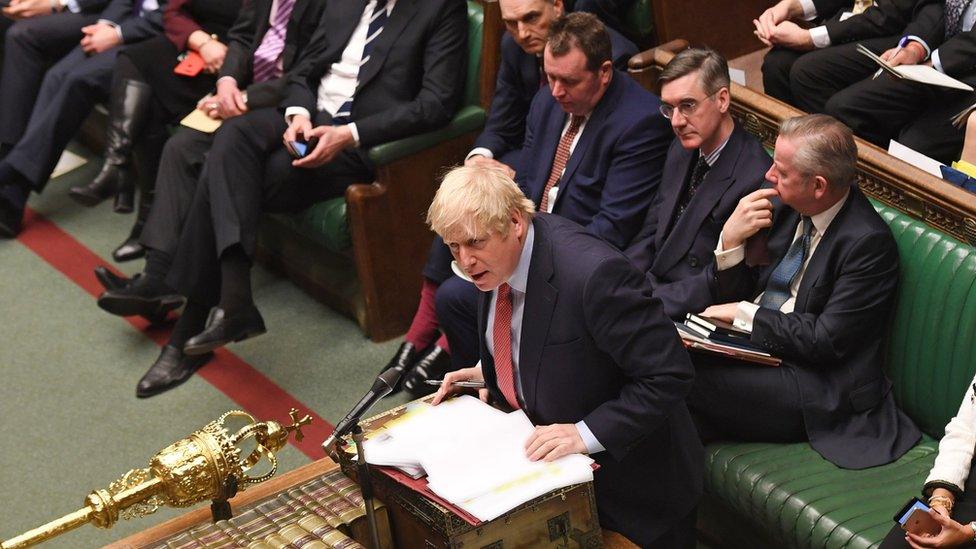
MPs open (11:30) with half an hour of Welsh Questions, followed by Prime Minister's Question Time.
Then, the SNP's Chris Stephens has a Ten Minute Rule Bill, the Workers (Definition and Rights) Bill - this aims to establish a legal definition of employment, which will cover zero-hours contracts and agency workers, and help prevent abuses.
The main debate will be on the Second Reading of the Environment Bill.
A trio of the day's Westminster Hall debates caught my eye; London Labour MP Sarah Jones, who chairs the All Party Parliamentary Group on Knife Crime leads a debate (09:30) on school exclusions - she will point to a massive increase in school exclusions over recent years and the report by the APPG which highlights the impact of exclusions on youth violence.
The 11:00 debate on government support for business sees Tory newcomer Andrew Griffith, a former Downing Street adviser and chairman of the advisory board at the Centre for Policy Studies, a think tank setting out some of the industrial policy choices facing ministers - in particular on how to nurture companies in emerging sectors of the economy like artificial intelligence and life sciences, that can compete on a global scale.
The newly elected chair of the Environmental Audit Select Committee, Philip Dunne, leads a debate on energy efficiency measures in buildings to achieve net zero (14:30) in which he will highlight the need for "proactive steps forward" to improve energy efficiency in homes and workplaces, to achieve net zero by 2050. He believes the government should lead by example across the government estate, and he wants to influence the outcome of the government consultation on the Future Homes Standard.
In the Lords (15:00) questions to ministers the death penalty and illegal executions in Saudi Arabia, the costs to business of staff training for the new post-Brexit customs rules and extending the time limit on pre-charge police bail.
Then peers turn to the NHS Funding Bill. As a money bill, they will not oppose or amend it, and so they will take the second reading and remaining stages in a single gulp.
Thursday 27 February
Commons business opens (09:30) with questions to the chancellor of the Duchy of Lancaster and minister for the Cabinet Office (including Topical Questions).
Business Questions to the Leader of the House of Commons, Jacob Rees-Mogg, will be followed by the traditional (near) St David's Day debate on Welsh affairs.
In the Lords (11:00) questions to ministers cover reducing the use of single-use plastics, strengthening the Public Services (Social Value) Act, which requires people who commission public services to think about how they can also secure wider social, economic and environmental benefits, including using local providers, and delivering 300,000 homes per year by the mid-2020s.
The main debates are on the case for improved early years interventions to support children and families, led by the Bishop of Gloucester, Rachel Treweek, and the United States' proposals for peace between Israelis and Palestinians, led by Baroness Tonge.
Friday 28 February
Neither House sits.
- Published6 February 2020

- Published27 January 2020
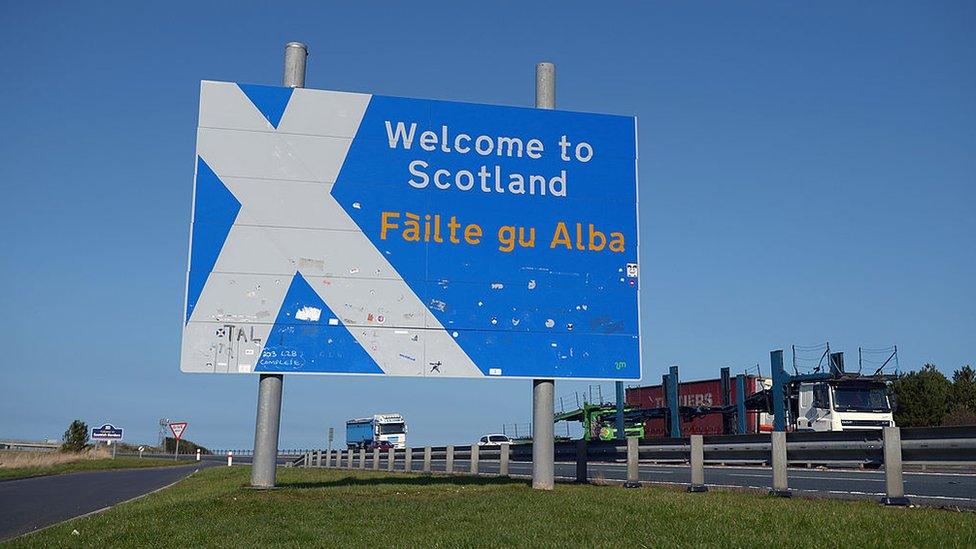
- Published29 January 2020

